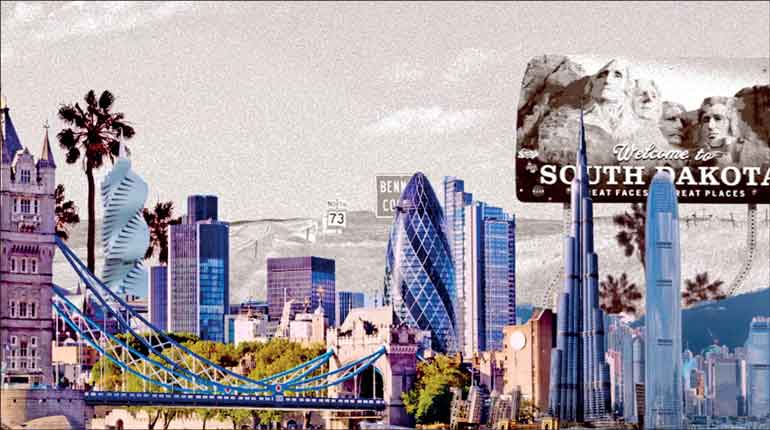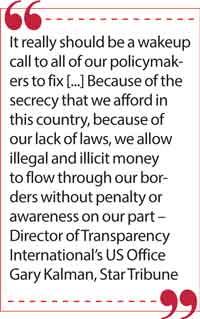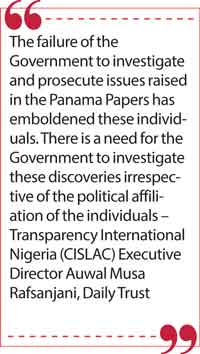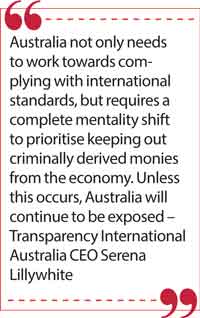Friday Feb 20, 2026
Friday Feb 20, 2026
Thursday, 14 October 2021 00:00 - - {{hitsCtrl.values.hits}}

The confidential documents reportedly show high-level officials, oligarchs and billionaires using shell companies to move wealth offshore and
to anonymously buy real estate or luxury goods
www.transparency.org: The release of the Pandora Papers last Sunday has provided an opportunity to take a comprehensive look at the underworld of the offshore industry.
The Pandora Papers is a large-scale investigative project by the International Consortium of Investigative Journalists, the Organized Crime and Corruption Reporting Project and media outlets in 117 countries. Journalists have analysed the documents leaked from 14 corporate service providers – all based in jurisdictions with high levels of financial secrecy.
The confidential documents reportedly show high-level officials, oligarchs and billionaires using shell companies to move wealth offshore and to anonymously buy real estate or luxury goods.
Globally, the Pandora Papers must create a new momentum for ending the decades-long abuse of corporate secrecy and pushing hesitant decision-makers into action. These investigations come at a time when the world is moving closer to a new global standard on corporate transparency. The Financial Action Task Force members should use this crucial opportunity to require public, central registers of company owners in all countries.
Simultaneously, national governments need to get their own affairs in order.
First, power players
Over 300 politicians from 90 countries – including 35 former or current government leaders – are alleged to have evaded scrutiny and shielded themselves with anonymity. Individuals who should be taking decisive steps for tackling the flows of dirty money have themselves been abusing the system’s opacity. In the months to come, they will have a lot of explaining to do – to the public and to the authorities.
Brazil
Latin America did not escape scrutiny from the Pandora Papers, with 14 current and former heads of state and a myriad of politicians at the highest level of government implicated in this massive leak’s disheartening findings. One of the noteworthy names is the one of Paulo Guedes who, while in office as Brazil’s Minister of Economy, kept a company in the British Virgin Islands (BVI) with almost $ 10 million invested in a Crédit Suisse account in New York – information far beyond the public’s reach until now.
One of the noteworthy names is the one of Paulo Guedes who, while in office as Brazil’s Minister of Economy, kept a company in the British Virgin Islands (BVI) with almost $ 10 million invested in a Crédit Suisse account in New York – information far beyond the public’s reach until now.
Apart from the notorious ethical breach of having untaxed and safely kept offshore investments while poverty is expected to rise in Brazil – investments which are at least immune but also potentially profiting from the plummeting value of the country’s currency – Paulo Guedes is also thought to have violated national legislation on conflicts of interest. As the head of Brazil’s economy, Guedes has fiscal and monetary policies under his command, and the decision he made to shift the minimum threshold of reporting duties to those who possess investments offshore from $ 100,000 to $ 1 million – coupled with the tax reduction on the repatriation of offshore funds he proposed to the Brazilian congress – raise an eyebrow.
As Brazil’s lower chamber summons the country’s Minister of Economy to explain himself, Transparency International Brazil is calling for more transparency over the real beneficiaries of offshore companies as well as for a reform of the country’s asset declaration regime to ensure that the public can also scrutinise potential conflicts of interest by those making decisions on their behalf.
Czech Republic
In 2018, Transparency International Czech Republic found that Prime Minister Andrej Babiš was the sole beneficiary of the two trust funds that owned shares of a Czech conglomerate Agrofert, which was to receive significant EU subsidies. Their discovery was possible thanks to Slovakia’s free and public platform where ownership information of companies that receive public contracts or licences is recorded.
As it turns out, Babiš was also the beneficial owner of other offshore companies in BVI, Monaco and the United States (US). This time around, however, the discovery was possible only thanks to leaked documents obtained by investigative journalists since none of these countries where the offshore companies were incorporated provide information on the real owners of companies and trusts.
With the help of the Panamanian service provider Alemán, Cordero, Galindo & Lee – known as Alcogal – the Czech Prime Minister set up the anonymous companies and, in 2009, moved funds to buy, among others, a luxurious property on the French Riviera while keeping his ownership secret. The service provider ended up dropping Babiš as a client in 2016, following the announcement of investigations on whether one of his companies had benefitted from EU subsidies intended to small businesses.
While according to rules in the Czech Republic, the Prime Minister has to disclose assets, declaration forms obtained by journalists show that neither the French property nor the companies linked to him appear in documents that he has filed since entering politics.
Transparency International Czech Republic is calling for a full investigation into the deals. This week, the Czech Senate Commission for public procurement held a debate about the revelations and the Chairman called for investigations to be opened. According to the Commission, the revelations should also be analysed by the European Public Prosecutor’s Office.
Lebanon
The revelations that Lebanon’s top politicians and businesspeople have been offshoring their wealth are difficult to fathom at a time when the country grapples with one of the worst socio-economic crises. Among them is the new Prime Minister Najib Mikati, who reportedly bought property worth $ 10 million in Monaco through an offshore company registered in Panama. The Prime Minister has stated that his fortune was amassed prior to his involvement in Lebanese politics and that his assets were disclosed to the Lebanese Constitutional Council.
fathom at a time when the country grapples with one of the worst socio-economic crises. Among them is the new Prime Minister Najib Mikati, who reportedly bought property worth $ 10 million in Monaco through an offshore company registered in Panama. The Prime Minister has stated that his fortune was amassed prior to his involvement in Lebanese politics and that his assets were disclosed to the Lebanese Constitutional Council.
Lebanese-owned companied topped the list of the BVI-based Trident Trust’s – where the largest number of documents came from – leaked clients.
Transparency International’s chapter, the Lebanese Transparency Association has stressed the need for competent authorities to investigate the assets of these companies and identify their origin. They call for the confiscation and recovery of funds derived from corruption, if any, and for an imposition of taxes if individuals named in the Pandora Papers failed to declare these assets in Lebanon. Our chapter is also calling for the establishment of a National Anti-Corruption Commission (NACC) to exercise its jurisdiction to investigate suspected corruption and audit financial disclosures and interests of public officials whenever the need arises.
Nigeria
An investigation by Finance Uncovered and Premium Times found that more than 100 powerful Nigerians used anonymous companies to buy properties with a total worth of £ 350 million in the United Kingdom (UK) since 1990. Current and former high-level public officials, such as ministers and state governors, are reportedly on the list.
Nigerian powerholders’ secretive dealings were previously reported as part of the Panama Papers and FinCEN Files investigations. Inaction over past disclosures has created a sense of impunity, says Auwal Musa Rafsanjani, Executive Director of our Nigerian chapter CISLAC.
The Nigerian Government needs to investigate the Pandora Papers revelations irrespective of the political affiliation of the individuals, CISLAC believes. The Government should also equip the Code of Conduct Bureau with staff and resources to adequately scrutinise officials’ asset declarations. To enable proper prosecution of these cases, the authorities should coordinate with their counterparts in other countries and exchange information.
Sri Lanka
Thirukumar Nadesan is the husband of Nirupama Rajapaksa, former Parliamentarian and former Deputy Minister of Water Supply and Drainage, and a descendant of the Rajapaksa clan, which dominated Sri Lankan politics for many years. Confidential documents reportedly show that he is also the beneficial owner of shell companies used to purchase luxurious properties in Australia and the UK as well as an art collection, stored in the Geneva free port, estimated at more than $ 4 million. The power couple counted with the help of Asiaciti Trust – a corporate service provider based in Singapore – to create shell companies in secrecy jurisdictions and trusts in New Zealand to transfer funds across countries and even to apply for a ‘golden passport’ in Cyprus.
Transparency International Sri Lanka is calling on the authorities to ensure that independent investigations are carried out with expediency. Law enforcement authorities and the judiciary should not only pursue new evidence but also complete the existing pending investigations against the couple without interference. Our chapter in Sri Lanka has also filed a complaint with the Bribery Commission, requesting an investigation into the unexplained wealth of Nadesan and Nirupama Rajapaksa.
Let’s not forget the enablers
Despite the damning evidence from the Panama Papers, corporate service providers and other private sector intermediaries continue to operate with little scrutiny and obligations in too many countries. Lax rules and loopholes have also opened the financial sectors of the advanced economies to abuse.
Australia
The Pandora Papers reveal that the Sri Lankan power couple, Thirukumar Nadesan and Nirupama Rajapaksa, used a Samoa-registered company to purchase properties in Australia. An investigation by ABC News found that each transaction involved layers of trusts and companies.
The country’s weak anti-money laundering laws mean there is no requirement for the gatekeepers – lawyers, accountants and real estate agents – to ask questions as to the source of the money and to report suspicious transactions to the authorities. Large sums of illicit funds can therefore be concealed and integrated into the legitimate economy through the real estate sector. This has made the country’s property market attractive to suspicious cash, according to Transparency International Australia.
The Financial Action Task Force has been urging Australia to strengthen its anti-money laundering laws for fifteen years. While there have been some amendments, a lack of transparency in beneficial ownership and a similar lack of coverage of the enablers leave a gaping hole.
New Zealand
In New Zealand, trusts were reportedly used by businesspeople and politicians from China, Brazil, Russia and Romania – some of whom faced serious corruption and money laundering charges back home.
Until recently, New Zealand was a known haven for foreigners who could avoid taxes and hide their identities. Since 2017, foreign-owned trusts have had to disclose the identities of their beneficiaries and basic information on their assets to the authorities. This law led to the set-up of a register of foreign trusts and a requirement for the provision of a trust deed, particulars of the settlor and the beneficiaries and a copy of the accounts.
This law change has resulted in a 75% reduction in the number of foreign trusts registered in 2020, but problems remain with both foreign-owned and domestic trusts. Transparency International New Zealand is calling for further improvements to the trust regime.
Panama
Out of the 14 corporate service providers feature in the Pandora Papers, two are based in Panama. According to Libertad Ciudadana, Transparency International’s chapter in Panama, the new revelations underscore the importance of moving forward with the implementation of the beneficial ownership register after an 18-month-long delay.
Corporate service providers play an outsized role in Panama’s anti-money laundering framework as they serve as “resident agents”. Offshore companies set up in Panama need a resident agent and the obligation to identify the actual people – beneficial owners – behind companies lies with them.
This is not the first international scandal implicating the country’s offshore industry. The infamous Mossack Fonseca was at the centre of the 2016 Panama Papers, and even if it has since then shut down, the repercussions from the damning revelations are still being felt by the country. Just this week, the EU announced Panama will remain black-listed as a non-cooperative tax haven.
United Kingdom
The Pandora Papers once again exposed UK’s property market as magnet for dirty money. The leaked data contains names of high-profile foreign public officials, individuals accused of corruption and UK political donors who own more than $ 7 billion worth of UK real estate through anonymous companies.
Azerbaijan’s ruling family reportedly used a BVI-registered company to buy a secret property empire worth $ 700 million in the UK over the course of 15 years.
Now, Transparency International UK is calling for the fast-tracking of legislation that would close the loophole that allows individuals to buy and sell UK property anonymously by using companies registered in secrecy jurisdictions.
United States
The Pandora Papers have exposed the US as one of the world’s leading secrecy jurisdictions. Several states – including Delaware, Florida, South Dakota, Nevada and New Hampshire – have emerged as global hotspots for those seeking to hide their assets and minimise their tax burden.
The Pandora Papers revealed 206 US-based trusts in 15 different states that held assets of more than $ 1 billion. Among them, some reportedly held assets linked to people or companies suspected of corruption or fraud. Transparency International’s US Office is calling on the US Treasury Department to help close the secrecy loophole for trusts by issuing a rule implementing the landmark Corporate Transparency Act that requires all trusts not expressly exempted in the law to report their true owners.
Furthermore, gatekeepers such as lawyers, investment advisors, accountants and corporate service providers are currently under no obligation to conduct due diligence on their clients, ascertain source of their funds or to report suspicious behaviour to authorities. The US should close also this major loophole and extend anti-money laundering obligations to these professional enablers.
(Source: https://www.transparency.org/en/news/pandora-papers-10-countries-investigations-policy-reforms?utm_source=linkedin&utm_medium=social#)